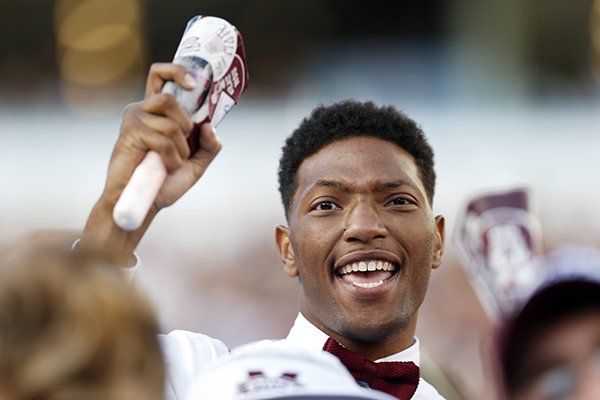FAYETTEVILLE -- First-year University of Arkansas Coach Chad Morris was a little hard of hearing during the opening of his weekly radio show Wednesday night.
"My ears are still ringing," Morris told Razorbacks' play-by-play announcer Chuck Barrett.
Morris had just left Wednesday's workout, which the Razorbacks had conducted inside the Walker Pavilion in advance of Saturday's 11 a.m. game at Mississippi State.
Accompanying the Razorbacks in the pavilion were loudspeakers which normally pump out all genres of music, typically with a theme related to that week's opponent.
But the speakers on Wednesday weren't blasting "Mississippi Queen" by Mountain, "Mississippi Girl" by Faith Hill, "Roll on Mississippi" by Charlie Pride, "The Mississippi Squirrel Revival" by Ray Stevens or "Mississippi Moon" by John Anderson.
Nope. The Walker Pavilion was being blown out by loud crowd noise, featuring an intermittent piercing shrieking woman, and the sound of cowbells.
Lots of cowbells. Loud, clanging, eardrum-slaying cowbells.
Morris is headed for his first game at Mississippi State. Many other Razorbacks coaches, players and auxiliary personnel have heard the three-hour assault of cowbells at Davis Wade Stadium. Others have not.
On Tuesday, Arkansas had practiced outside in frosty air with the wind-chill factor at 24 degrees and dropping, with the music blaring as normal.
Moments before departing to conduct the practice, Morris had opened his five-minute session with the media by saying, "We'll kind of close the environment up and turn the music up a little bit and see if we can have a little crowd noise today."
He was asked if the Razorbacks were going to practice with just music or if cowbells were on the sound menu.
"A little of both," he said, smiling. "We'll see what we can do to turn it up and try to make it where we can't think."
Bumper Pool and Dalton Wagner, who will be Davis Wade first-timers Saturday, were the guest players on Morris' radio show, and they still seemed affected by the ringing when they chatted with Barrett and former Razorbacks great Quinn Grovey.
"It was very loud. There was like a loud screaming with the cowbells as well, so it made it even worse," said Pool, a true freshman linebacker.
"It's piercing is what it was," said Wagner, a redshirt freshman offensive tackle. "The first time they turned it on I was like, 'Golly, what was that?' You just hear the cowbells and the yelling and everything. The same screaming kind of comes in like every 30 seconds. ... It was very loud."
And that's not even the real thing. Game days in Starkville are more intense.
Arkansas offensive coordinator Joe Craddock has experienced the cowbells in person. He was a senior quarterback for Middle Tennessee State in a 31-22 loss at Mississippi State on Oct. 25, 2008.
Craddock completed 23 of 40 passes for 235 yards, with a touchdown and no interceptions, and rushed for 23 yards. The Blue Raiders held a 16-14 lead in the third quarter before the Bulldogs rallied.
Craddock said the Razorbacks' signal-based play-calling should run as expected and not be affected by the cowbells as long as "they don't fog up the stadium or turn the lights off."
Hearing between plays is an issue due to the bells, Arkansas players said.
"It can be distracting if you let it. We're definitely going to have to communicate great," defensive tackle Armon Watts said.
"I heard it gets on your nerves, and they do it at the most critical times," said receiver La'Michael Pettway, who missed the 2016 game in Starkville to attend his grandmother's funeral.
The SEC instituted a rule banning artificial noisemakers in 1974, but because so many Mississippi State fans rang them anyway, the league reached what was called a "cowbell compromise" for 2011. Fans are prohibited from ringing the bells from the time the offensive center puts his hand on the football and until the play is whistled dead, according to the league rule. Mississippi State encourages fans to "ring responsibly."
Arkansas defensive coordinator John Chavis took a diplomatic approach to the cowbell question.
"It's cowbells. It's a great tradition," Chavis said. "It's a great environment and that's what you look for when you start talking about SEC venues. They're all good and unique in their own way. ... They have great fan support and they make it tough on visiting teams when they come in there.
"The thing about coaching defense is when we're on the field the cowbells won'g be going. It's easier to communicate on the road because the home team isn't going to be making a lot of noise when the [opposing] defense is on the field."
The cowbell tradition apparently dates from the 1930s, according to stories in The (Jackson, Miss.) Clarion-Ledger, after Mississippi State beat arch-rival Ole Miss in a game during which a jersey cow wandered onto the field. Students took on the cow and cowbells as good luck charms, according to the newspaper.
Now opposing fans travel to games with ear plugs and aspirins and rival players endure the bothersome ringing for three-plus hours.
"It was loud. It was my first road game playing, so it was very loud to me," Arkansas junior linebacker De'Jon Harris said of the 2016 game won 58-42 by the Razorbacks. "It really was irritating, but we got off to a good start so they weren't bringing it that much."
Sports on 11/16/2018

